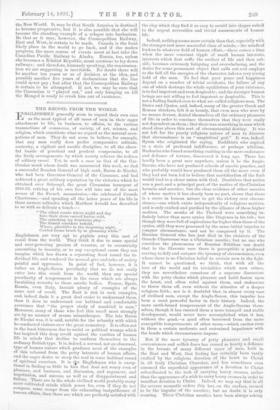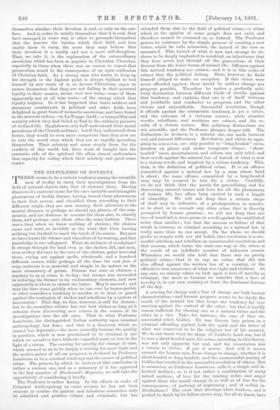THE RECOIL FROM THE WORLD. E NGLISHMEN generally seem to regard
their own race as the most typical of all races of men" in their eager attachment to life, to business, to affairs, to the various transactions of commerce, of society, of art, science, and religion, which constitute what we regard as the natural occu- pations of men. They do not seem to believe, for example, that any man really does prefer comparative solitude, austerity, a vigilant and ascetic discipline, to all the cheer- ful bustle of practical and prudent compromise, to all the lively arrangements by which society relieves the tedium of solitary ennui. Yet, in such a case as that of the Car- thusian monk whose death was announced this week, we find a successful Russian General of high rank, Baron de Nicolai, who had been Governor-General of the Caucasus, and had achieved a great military reputation by the victories which he obtained over Schamyl, the great Circassian insurgent of 1856-59, retiring of his own free will into one of the most severe of the French monasteries,—the celebrated Grande Chartreuse,—and spending all the latter years of his life in those austere solitudes which Matthew Arnold has described to us with so delicate a touch :- " The silent courts whore night and day Into their stone carved basins cold, The splashing icy fountains play— The humid corridors behold,
Where, ghostlike in the deepening night, Cowled forms brush by in gleaming white,"
Englishmen are very apt to explain away this sort of recoil from the world. They think it due to some special and over-powering passion of remorse, or to eccentricity amounting to insanity, or to any exceptional cause they can imagine which has drawn a separating flood round the in- dividual life, and rendered the normal give-and-take of society painful and oppressive. In point of fact, however, it is rather an Anglo-Saxon peculiarity that we do not easily enter into this recoil from the world, than any special peculiarity of temperament in the races which are always furnishing recruits to these ascetic bodies. France, Spain, Russia, even Italy, furnish plenty of examples of the same sort of recoil. The East is rich in such examples, and, indeed, finds it a great deal easier to understand them, than it does to understand our habitual and comfortable assurance that "the proper study of mankind is man." Moreover, many of those who feel this recoil most strongly are by no manner of means misanthropes. The late Baron de Nicolai was, it is said, notable for the urbanity with which he conducted visitors over the great monastery. It is often not in the least bitterness due to social or political wrongs which has inspired this deep revolt against the vanities of human life in minds that decline to conform themselves to the ordinary British type. It is, indeed, a normal, not an abnormal, type of human nature which produces most of the examples of this rebound from the petty interests of human affairs, and the eager desire to steep the soul in some habitual round of spiritual exercises. It is the Englishman who is excep- tional in finding so little in him that dog not weary even of pleasure, and business, and discussion, and argument, and negotiation, and success, as well as of disappointment and failure. There are in the whole civilised world. probably many more cultivated minds which yearn for, even if they do not compass, some escape from the exhausting insignificance of human affairs, than there arc which are perfectly satisfied with life.the clay which they find it so easy to mould into shapes suited Indeed,urgent necessities and trivial amusements of human fe. Indeed, nothing seems more certain than that, especially with the stronger and more masterful class of minds,—the minds of leaders in whatever field of human effort,—there comes a time when the mere constant ripple of small human interests, interests which first ruffle the surface of life and then sub- side, becomes extremely fatiguing and overwhelming, and the desire for some permanent object that calls out and employs to the full all the energies of the character, takes a very strong hold of the man. To feel that your peace and happiness depend on a number of trivial accidents, the failure of any one of which destroys the whole equilibrium of your existence, is to feel impotent and even despicable; and the stronger human beings are not willing to feel impotent or despicable. This is not a feeling limited even to what are called religious men. The Stoics and Cynics, and, indeed, many of the greater Greek and Roman thinkers, felt it so keenly, that even men who were by no means devout, denied themselves all the ordinary pleasures of life in order to convince themselves that they were really not dependent on them ; that there was something in man which stood clear above this sort of circumstantial destiny. It was not left for the purely religious nature of man to discover that circumstance is an " unspiritual god." It was, indeed, Byron who originated the saying. Buddhists who aspired to a state of profound indifference, or perhaps nihilism, Brahmins who found something exalting in the mere endurance and defiance of torture, discovered it long ago. There has hardly been a great race anywhere, unless it be the Anglo- Saxons, who have not produced schools of ascetic practice, and who probably would have produced them all the more even if they had not been led to believe that mortification of the flesh would lead to a closer union with God. Doubtless that notion was a part, and a principal part, of the motive of the Christian hermits and ascetics ; but the clear evidence of other ascetics of whose motive it has clearly been no part, shows that there is a crave in human nature to get the victory over circum- stance,—one which exists independently of religious motives, and is only exalted and purified by the alliance of these higher motives. The monks of the Thebald were something in- finitely better than mere cynics like Diogenes in his tub ; but though they were full of aspirations far higher than those of the cynics, still they were possessed by the same initial impulse to conquer circumstance, and not be conquered by it. The Russian General who has just died in the cloisters of the Grande Chartreuse was a Christian ascetic; but no one who considers the phenomena of Russian Nihilism can doubt that in the Slavonic race there is perceptible a profound craving to defy and conquer the tyranny of circumstance, even where there is no Christian belief to sustain men in the fight. It cannot be questioned, we think, that with all the love of the world and its trivialities which men evince, they are nevertheless conscious of a supreme discontent with the petty chains which pleasure and habit fasten upon the heart, and often rebel against them, and endeavour to throw them off, even without the stimulus of a deeper religious faith ; nor is it doubtful that, in almost every race of civilised men, except the Anglo-Saxon, this impulse has been a most powerful factor in their history. Indeed, the more earth-bound temperament of the Anglo-Saxons them- selves, though it has ensured them a more tranquil and stable development, would never have accomplished what it has, without the goad,—a goad often borrowed from the more susceptible temperaments of other races,—which excites even in them a certain moderate and restrained impatience with the bonds which circumstances impose.
But if the mere tyranny of petty pleasures and small conveniences and selfish fears has roused so hearty a defiance in the breasts of many different races of men, both in the East and West, that feeling has certainly been vastly exalted' by the religious devotion of the heart to Christ in all truly Christian Churches, and has sometimes even assumed the superficial appearance of a devotion to Christ subordinated to the task of carrying heavy crosses, rather than the appearance of a wish to carry heavy crosses in order to manifest devotion to Christ. Indeed, we may say that in all the severer monastic orders this has, on the surface, seemed to be the impulse of the ascetics; but no doubt it is only seeming. These Christian ascetics have been always asking themselves whether their devotion is real, or only on the sur- face. And in order to satisfy themselves that it is real, they have managed in some way or other to persuade themselves that the heavier the burden which their faith and love enable them to carry, the more they may believe that their devotion is a reality and not a mere self-deception. That, we take it, is the explanation of the extraordinary asceticism which has been so popular in Christian Churches, especially in times when there was no reason to expect that persecution would be the consequence of an open confession of Christian faith. As a strong man who wants to keep up his strength to the highest point is always vigilant to test himself by new trials of it, so devout Christians, eager to assure themselves that they are not failing in their personal loyalty to their master, devise ever new tests,—some of them apparently not at all wise tests,—of the energy which that loyalty inspires. So it has happened that brave soldiers and strenuous combatants in political and other fields have delighted in great feats of monastic asceticism, and have found in the severest orders,—in La Trappe itself,—a tranquillity and serenity which they had failed to find in the ordinary pursuits of civilised life. Englishmen only half-understand these moral paradoxes of the Church militant ; but if they understood them better, they would be even more competent than they now are to rule the world over which they are so rapidly spreading themselves. Their sobriety and sense steady them for the conflicts of this world, but their want of insight into the romantic side of the spiritual life often almost undermines that capacity for ruling which their sobriety and good sense confer.



































 Previous page
Previous page